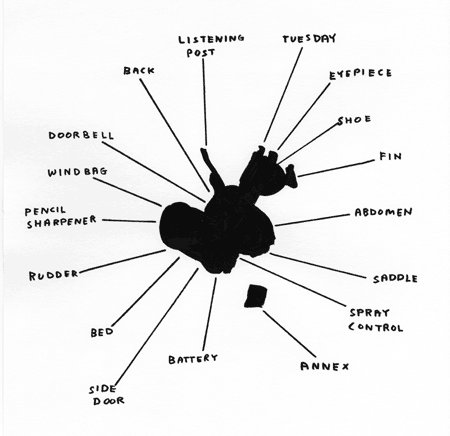David Shrigley
dal 6/9/2007 al 3/11/2007
Segnalato da
6/9/2007
David Shrigley
Malmo Konsthall, Malmo
Everything must have a name. Shrigley is best known for his black and white, text-based, deceptively amateurish ink drawings. Besides drawings the exhibition compiles a vast number of sculptures, inkjet prints, monotypes, t-shirts, sound works, films, photographs and last but not least, books.

Everything must have a name
The exhibition Everything must have a name by David Shrigley (b. 1968, in
Macclesfield, England) will be the artist's first retrospective solo exhibition in
Northern Europe. Shrigley is best known for his black and white, text-based,
deceptively amateurish ink drawings. Besides drawings Everything must have a name
will compile a vast number of sculptures, inkjet prints, monotypes, t-shirts, sound
works, films, photographs and last but not least, books. Around 600 works will be
presented in many different forms and formats at Malmö Konsthall. The
exhibition will show animated films such as Who I Am And What I Want (2006), New
Friends (2006), Laundry (2006), and sculptures like Nutless (2001), Unfinished
letter (2003) and Black pot (2004) among many others. Malmo Konsthall will also
present 16 recent paintings made for Deerhoof's record Friend Opportunity and his
own record Shrigley Forced To Speak With Others (2006).
David Shrigley will also make several new sculptural and site specific pieces for
Malmö Konsthall, which he has divided into more than 20 individual spaces and
corridors with individual names, titles and themes.
The ambition of the exhibition is to present David Shrigley's extensive body of
work, and to show his unique pieces next to the multiplied works made for t-shirts,
coffee mugs, record covers, greeting cards and music videos.
In 1991, Shrigley made his first book Slug Trails, and many since, characterized by
his humorous, dark satirical drawings and writing. Through the books and his weekly
drawings in The Guardian (since September 2005), the animation series Modern thought
by David Shrigley for BBC, the music videos Blur's Good Song (2003) and Bonnie
Prince Billy's Agnes, queen of sorrow (2004) Shrigley has developed different
audiences and has managed to bridge the gap between popular culture and fine art.
Throughout Shrigley's many different ways of working the viewer will find an absurd
logic to life. Shrigley comments on the world with a nihilistic wit, word games and
interrogations leaving us question ourselves and what is around us.
In many works, there are lists with rules and regulations, do's and
don't and lists of rights and wrongs. God and Satan walk hand in hand and the
turn of the screw is the absence of belief, which leads to doubt and even more
questions. There are lists of questions, confessions and suggestions, and the
individual -- human, animal or non-descript organism -- has to select and decide on
what ethics and morality to follow (and the bleak consequences if they are broken).
On the backside of the book Grip (2000) David Shrigley gives the following
instruction: RULES: They say that rules are made to be broken but this is just
a figure of speech. Rules are made to be kept. Rules are there to guide us. As
modern world grows ever more complicated and appears to now be populated mostly by
nutters rules have become increasingly important. Those who break the rules will be
beaten with a rod of iron a then made to write out the rules one million times.
Bending the rules is also forbidden. Bent rules are useless
What may seem normal to begin with often takes a drastic and grotesque turn in
Shrigley's universe. There are always consequences to one's actions and below the
surface thoughtful truths about the human condition and human soul are revealed.
David Shrigley studied Fine Art at Glasgow School of Art from 1988 to 1991, and has
exhibited widely in Europe and North America including solo shows at Centro de Arte
Caja de Burgos (Burgos), DCA, (Dundee, 2006), Musée d'Art Moderne et
Contemporain (Geneva), UCLA Hammer Museum (Los Angeles), and Kunsthaus Zürich.
His illustrations have appeared in newspapers and magazines such as Esquire (Japan),
Donna (Italy), Frieze (UK), The Guardian (UK),
Maisonneuve (Canada), Du (Switzerland).
David Shrigley lives and works in Glasgow.
Opening Friday 7 September 7-9 p.m.
Malmo Konsthall
S:t Johannesgatan, 7 - Malmo



